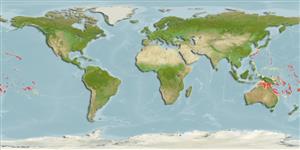Teleostei (teleosts) >
Acanthuriformes (Surgeonfishes) >
Acanthuridae (Surgeonfishes, tangs, unicornfishes) > Nasinae
Etymology: Naso: Latin, nasus = nose (Ref. 45335); caesius: Naso caesius is in reference to its most common ground color which is bluish grey.
More on authors: Randall & Bell.
Environment: milieu / climate zone / depth range / distribution range
Ecology
Marine; reef-associated; depth range 15 - 50 m (Ref. 90102). Tropical
Pacific Ocean: Northern Marianas, Marshall Islands, Hawaiian Islands, Pitcairn group, Society Islands (French Polynesia), Australia and New Caledonia.
Size / Weight / Age
Maturity: Lm ? range ? - ? cm
Max length : 45.6 cm SL male/unsexed; (Ref. 9944)
Dorsal spines (total): 6 - 7; Dorsal soft rays (total): 27 - 30; Anal spines: 2; Anal soft rays: 28 - 31. Bluish grey to grey-brown, capable of displaying a colour pattern of vertically elongate blotches (lighter or darker than ground colour) on side and upper part of body. Opercular and preopercular margins not dark brown. Caudal fin uniform in colour. Gill rakers on lower limb of gill arches entirely pale. Edge of lower lip not white (Ref 9808).
Body shape (shape guide): fusiform / normal; Cross section: compressed.
Benthopelagic over coral and rock (Ref. 58302). Occurs singly or in aggregations along clear seaward and outer lagoon reefs and channels (Ref. 37816). Feeds in midwater on zooplankton (Ref. 90102).
Life cycle and mating behavior
Maturity | Reproduction | Spawning | Eggs | Fecundity | Larvae
Randall, J.E. and L.J. Bell, 1992. Naso caesius, a new acanthurid fish from the Central Pacific. Pac. Sci. 46(3):344-352. (Ref. 9944)
IUCN Red List Status (Ref. 130435: Version 2025-1)
Threat to humans
Harmless
Human uses
Fisheries: commercial
Tools
Special reports
Download XML
Internet sources
Estimates based on models
Preferred temperature (Ref.
123201): 24.7 - 28.8, mean 26.5 °C (based on 82 cells).
Phylogenetic diversity index (Ref.
82804): PD
50 = 0.5000 [Uniqueness, from 0.5 = low to 2.0 = high].
Bayesian length-weight: a=0.02089 (0.00974 - 0.04480), b=2.96 (2.78 - 3.14), in cm total length, based on LWR estimates for this Genus-body shape (Ref.
93245).
Trophic level (Ref.
69278): 2.3 ±0.1 se; based on size and trophs of closest relatives
Resilience (Ref.
120179): Medium, minimum population doubling time 1.4 - 4.4 years (Preliminary K or Fecundity.).
Fishing Vulnerability (Ref.
59153): Moderate vulnerability (42 of 100).
🛈
Nutrients (Ref.
124155): Calcium = 40.2 [24.4, 76.9] mg/100g; Iron = 0.566 [0.291, 0.972] mg/100g; Protein = 18.6 [17.4, 19.7] %; Omega3 = 0.123 [0.078, 0.227] g/100g; Selenium = 35.6 [18.7, 63.5] μg/100g; VitaminA = 56.6 [17.3, 183.1] μg/100g; Zinc = 1.54 [1.05, 2.21] mg/100g (wet weight);
